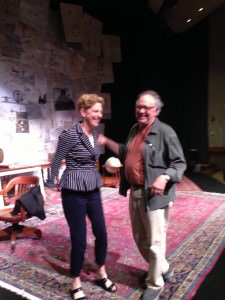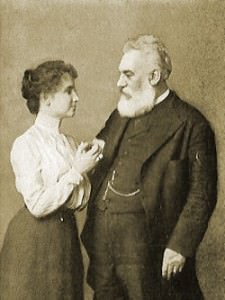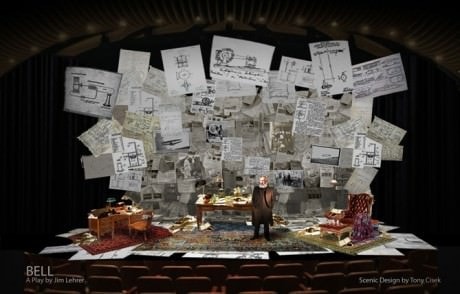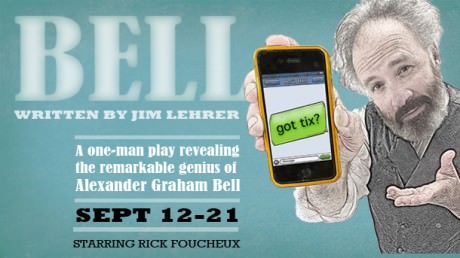
National Geographic has been thinking outside its trademark yellow box a lot lately. The Society’s mission is “Inspiring people to care about the planet.” Adventure and exploration are its DNA. Still, that doesn’t explain how in the world National Geographic got into producing top-tier-talent live theater—which is exactly what it’s venturing to do, for the first time ever, with Bell, a one-man play about Alexander Graham Bell written by the renowned journalist and author Jim Lehrer, and starring the celebrated Washington actor Rick Foucheux.
To find out more about this curiosity, I embarked on an exploration of my own. And what I discovered—in a delightful and insightful interview with Rick and MJ Jacobsen—is a story of not only invention but also of lasting love.
We met a week before Bell’s opening in MJ’s office at National Geographic, where she is Senior Vice President of Communications. Since 1977, MJ and Rick have shared a dual-career marriage and collaborated on life. But now—hold the phone, Watson!—they’ve collaborated on art.
John: Take me back to that scene where you two came up with the idea for Bell. The place: your kitchen table in Silver Spring. The time: toward the end of 2011.
Rick: At the end of the year you sit around over a glass of wine and Christmas cheer and you review the year gone by, what’s coming up—Mary Jeanne and I have always done that; we’re always interested in what each other is doing and supportive of each other. And this particular night, I asked a simple question: “What big things are on your agenda in the next year, MJ?” And she said, “Well, the year after next the National Geographic is going to be celebrating its 125th anniversary.”
MJ: I was working on what we call cross-platform plans—how is this division going to celebrate the anniversary, how is that division going to celebrate it? I was working on that document and ginning up interest.
Rick: I knew that Alexander Graham Bell had been the Society’s second president, and in a sort of light bulb moment, I said, “Has anyone ever done a one-man show about Bell?”
MJ: At the time we had just seen Ann, at The Kennedy Center, the one-woman show [about Ann Richards, former Governor of Texas] played by Holland Taylor.
Rick: I’m always looking for vehicles, and I love the one-man-show format. Bell seemed to me a right contender for it: He had his hands in a lot of different pots, he’s well known, and he had something of a personality; he wasn’t a boring guy.
MJ: And I thought: That’s a great idea!
Rick: And then that naturally led to: Who better to do a show like that than the National Geographic Society? I had worked for Greg McGruder [Vice President for Public Programs] and NG Live playing various roles, so I knew, and I knew that Mary Jeanne knew, who to pitch.
MJ: We said, let’s take Greg McGruder out to lunch and see what he thinks. We went right across the street, to Panache, and he said, “You know, this is crazy, but I love the idea. This isn’t exactly what we do at NG Live. But I might just be crazy enough to do it.” At that lunch we decided we needed a one-pager: Who was Alexander Graham Bell? So we worked on it, and we gave it to him, and then we all said, “Who would be a great playwright?” And we came up with Jim Lehrer.
What attracted you to Jim Lehrer?

MJ: We knew he was a Washingtonian. We wanted somebody local.
Rick: He was a good mix of Washington institutions: National Geographic Society; Bell himself, who was something of an icon, not only internationally but in Washington, because he did so much of his work here—and Lehrer, because of his long time as head of the PBS NewsHour. I was familiar with Jim’s plays, and his list of novels is as long as your arm. So I knew he had the literary chops. And in my experience doing two one-man shows in the past, both of whom were real-life figures [director Elia Kazan at Round House Theatre and inventor Buckminster Fuller at Arena Stage], I knew there would be some reporting involved; it wasn’t going to be purely a literary exercise. And the Geographic is at the top of the list when it comes to fact-checkers. So I knew we would have someone who would get his facts right.
So this play has been fact-checked?!
Rick: [Laughs]. Yes, it has.
I don’t think I’ve ever heard of a play that’s been fact-checked!
MJ: It hasn’t gone through National Geographic Magazine yet! [Laughs].
Rick: Let’s put it this way: Dramatic license is not an automatic take-for-granted at the National Geographic Society. So we were careful with that.
So what dramatically appealed to you about Bell’s story? Or did you let Jim Lehrer figure that out?
Rick: That was my question; that was the first hurdle that we came across. Bell, as brilliant as he was, had a fair amount of luck. He invented the telephone when he was 29, so found himself in possession of 100 percent of the Bell telephone company at age 30—and it was valuable even at that moment.
MJ: I think he gave a third of it to “Mr. Watson, I presume.”
Rick: I was speaking dramatically.
MJ: Okay. [Laughter].

Rick: The company took off like a rocket ship, because everybody knew that the telephone was in the works and everybody would have their name on a list to get one. So it was automatically super-valuable. By age 30, money was no object to this man. He was surrounded by loved ones. And he was able to go from fantastic idea to fantastic idea. He was the kid on the block with the best Erector set and was able to do anything he wanted, basically. So: Where’s the drama in that—someone who gets everything he wants? Where’s the conflict—the arresting conflict, the falling conflict? What we hung our hats on is that on his deathbed, he had a legitimate complaint, even though he had had all this success: As our play opens, Bell grumbles to his wife that, dammit, “I’ll only be known as Bell the telephone man! And I’m much more than that!” And then, upon realizing that his deathbed scene is being viewed by an audience of modern-day people, he stands up and proceeds to tell them exactly all the other things that he did. In funny, interesting detail.
I love it. You know, if you ask people today who’s a contemporary legend of invention, and who’s made goo-gobs of money with their invention, they’ll think of Steve Jobs, they’ll think of the guys who founded Google—
Rick: And Bill Gates.
I’m hearing some echoes of Bell in their stories. How is Bell different from what we know as icons of invention today, and how is he similar?
Rick: I’ve got a good answer for that, because I’ve been steeped in the script and rehearsals for the past four weeks, but I don’t want to monopolize the conversation…
MJ: I have not been steeped in the script, but I’ve worked here for 26 years. And here we say Bell reinvented the magazine. It was boring. It had a dull brown cover. But Bell came in as second president of the Society and said, “What are we going to do to fix this? We’ve gotta make this broader.” He was the one who gave the magazine its mantra, “Geography is the world and all that’s in it.” He’s the creative genius who sowed the seeds that made the magazine what it is today.
Is that in the play, what you just told me?
Rick: Oh absolutely, in a big way. There’s a meeting in his office where he tells everyone in no uncertain terms the way he thinks the magazine should look. [In Bell’s voice:] “Pictures! I want pictures that tell a story! Illustrations about life in action!” It’s a real Spencer Tracy moment in the play. It’s one of my favorites. [Laughs.]
MJ: He was the one who helped shape this magazine and ultimately the organization.
Rick: Bell was a celebrity of his day. And the same is true for Steve Jobs and Bill Gates, because they were superstars in our modern world of technology. In our play we invoke the names of Steve Jobs and An Wang, who got us to the starting gate of the fabulous inventions that we carry around in our pockets today. But I think we’re fairly spoiled. We go from one great handheld device after another. And we’re almost complacent about it; we expect it. Whereas the handheld devices we have today are much better than they were five years ago, imagine living in a time when we go from having no telephones, to telephones. That’s a bigger jump.
Did you always see yourself in the role of Bell?
Rick: Yes.
MJ: It was his idea. We presented that back at the original lunch.
Having played Buckminster Fuller, you were ready for another brilliant scientist?
Rick: Yes, and in the past two weeks I’ve asked myself, Am I absolutely crazy? [Laughter].
I saw the set design. And it’s like the movie A Beautiful Mind on stage, but the main character is sane – not crazy.
Rick: Yes, that’s right.
MJ: And he was kept on track by his wife, I might add.
Mabel.
MJ: Yes.
Who was deaf.
MJ: Correct. And you know she nurtured his genius. You’ll see that in the play too. It’s been fun to work with Rick, because we really haven’t worked together since WOWK-TV in Charleston-Huntington, West Virginia, in the late 1970s, when he hosted a talk show and I was a reporter, and then we got married. This has been a lot of fun, because just as Mabel nurtured their project, I’ve been able to contribute and nurture this idea.

How is Mabel a character in the play?
Rick: She’s a very important part of it. Running side-by-side in the play is the great love story that was Mabel and Alex. They were separated in age by ten years. She was fifteen when he met her, as her voice tutor. Her father [Gardiner Greene Hubbard, the first president of National Geographic Society] had hired him to help her speak, because she was deaf and she wasn’t using her voice. And under his tutelage she thrived. And they fell in love. And from then on it was a constant life of support and love. She kept the books, he was free to go off again and play with his Erector set, and she worried about all the things in the outside world that had to be worried about.
What was your reaction when you first saw Lehrer’s script?
MJ: We had a reading here at the end of 2012. We met in Hubbard Hall, around the original table where the Geographic was founded.
Rick: I thought, well, it’s all here. We just need to pare it down; we don’t want to do a two-hour play. But a nice, tight eighty minutes—let’s do it. And onstage this question: Will I be known for something more than the telephone? And why is that important? What is this incredible, egotistical beast within me that has to be fed?
I know National Geographic has really been extending its brand into new areas and platforms, and this is its first venture into live professional theater. So this has to be exciting on the inside. But on the outside—this is a hypothetical—let’s say there’s somebody who’s confused about that, and who might be wondering whether this is just institutional self-aggrandizing self-promotion and not a real theatergoing experience. If you had an elevator ride to tell them, how would you address that?
MJ: I would say: The topic is inherently dramatic and exciting, which is fodder for a play. I would say that National Geographic has hired a great actor, a great director [Jeremy Skidmore], a great set designer [Tony Cisek], lighting designer [Dan Covey], and sound designer [Matthew Nielson]—all award winning. All these guys are nominated for Helen Hayes Awards all the time. Most have won. Multiple times. So I would say that National Geographic hired all the right people—to write the show, act in the show, produce the show, stage it, costumes, in any way. They did it right.
Rick: We show this man, and we show the National Geographic, warts and all. Only last night, at the bar, Lehrer was surrounded by a group of actors, and he was waxing hot and eloquent about how not once did he ever receive any dictation from the front office on what this play was supposed to be.
Have you seen rehearsals?
MJ: I have seen some. I have read the script and heard it a couple of times. And I’ve helped with running lines.
Is that a trade secret?
Rick: No, she helps me all the time.
MJ: Usually I play the part of everybody else on stage. This time I just listen and say, “Oh you forgot the paragraph about blah blah.”
Rick [to John]: Do you have a couple hours free tonight? [Laughter.]
When you’re watching the show, MJ, you have three perspectives: You are Senior Vice President of Communications. You are married to the star. And it was your baby; you were there at the creation. Tell me what it’s like to see this play from all three points of view.
MJ: Wow. I’ll start with my day job: National Geographic. It’s fun to tell the public through this vehicle that Alexander Graham Bell was the second president of National Geographic. Most people don’t know that. My professional life is devoted to raising awareness about all of National Geographic’s programs and products. Most everybody knows that National Geographic gave [oceanographer] Jacques Cousteau and [primatologist ] Jane Goodall their first grants to conduct their research. Most everybody says, “Oh, I know, the yellow-bordered magazine.” Most people don’t know about the Bell piece. So as a professional, that’s satisfying to me. As Rick’s wife, I love to see him in great roles that are good for him. Some roles are a better fit than others, and from the moment when we were standing in our kitchen when he said, “Has anybody ever done a one-man show on Alexander Graham Bell” I thought to myself: That’s a great idea.
For him.
MJ: For him.
And for National Geographic.
MJ: Correct. And then, last but not least, being there on the ground floor, it’s just fun to watch it come to fruition. I mean, this idea really was born in our kitchen. And tentatively we told maybe a few people. And almost everybody has said, “That’s a great idea.” So it’s been fun for me nurturing it. For all three reasons.
Has anything surprised you?
MJ: The set. It’s such a perfect manifestation of Alexander Graham Bell’s creative head. It’s a perfect artistic rendering of what I imagine the man’s brain was like.

LINK
Watch a video biography of Alexander Graham Bell on biography.com.





Super article! I hope the show will be half as entertaining and know it will be. Can’t wait. Sterling folks are working on this. How many knew that it was Bell who said, “When one door closes, another opens; but we often look so long and so regretfully upon the closed door that we do not see the one which has opened for us.” What a focused individual. Good luck to all! (Can it extend?)
We spoke briefly in August with Rick and M.J. at the next table in a restaurant on Cape Breton Island in Nova Scotia. They were researching Bell, who built a large house outside the town of Baddeck on Lake Bras d’Or, where he and his family spent almost half their time. Although the house is closed to the public, we hope MJ and Rick were able to arrange a visit. The Bell Museum is close by and a must-see in Nova Scotia for visiting Americans. But Bell at Nat Geo expanded our understanding of this complex genius as only Rick Foucheux could do. And we encourage NatGeo to consider staging other one-actor plays about great adventurers, explorers, and scientists. And wouldn’t it be perfect if the Canadians staged the play near Baddeck, maybe even on the Bells’ beloved estate?